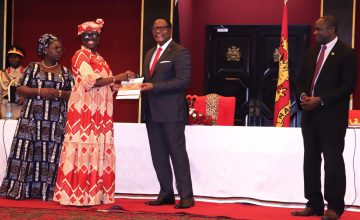Ighamba cries for a road

It’s rocky. It’s hilly. It takes you up and down, crossing rivers without bridges.
A rough footpath that splits thick bushes in Karonga North’s most tricky terrain marks a seemingly endless walk to the heart of Ighamba, a hard-to-reach pastoral community silently wishing policymakers would cast their eyes beyond buzzing roadside towns. No car. No bicycle.
The four-hour walk offers a glimpse of exclusion and how nobody seems to care about unvaccinated children that grow and get education by sheer chance in the hilltop population.
“For children, the future dies the day they are born,” says Ighamba Primary School head teacher Ibin Mkandawire.
Since 2010, Mkandawire has seen babies being born at home, at the hands of unskilled birth attendants—one of the reasons 645 lives out of 100 000 births are lost during childbirth. Some pregnant women, who cannot endure the 45km to Iponga Health Centre, sustain complications.
But nearly 200 babies birthed in risky circumstances have grown to become pupils at the school where many drop out before reaching Standard Eight.
“Most girls quit school due to teen pregnancies and early marriages while boys join their fathers in imbibing local brews which are widespread,” he says.
To what he terms “the hardest to reach in Karonga”, education is the only lifeline for some pupils who go into Standard One without being vaccinated.
“Upgrading the road would help open the area to development, quality education, civilisation and improved healthcare,” he says.
Perched in Ngolongo Village, Traditional Authority (T/A) Mwakaoko, Ighamba literally means ‘hills’ Chindali.
The Ndali migrants from Chitipa settled in the borderline hills 45km off Iponga near Songwe Border in search of fertile land for farming.
A century on, Village Head Ngolongo says they are only happy to have vast fields of rice, cassava and maize.
Their harvest is usually bought cheap by Tanzanian vendors who dispatch middlemen on the long road.
In this forgotten constituency, the school is a sign of modernity. It does not only serve learners; nearly 200 households in the area rely on the school’s borehole for safe water.
Besides, the school is a solitary symbol of government’s muted acknowledgment that Ighamba residents are citizens like any other—with a right to development.
Karonga director of public works Pass Nyirenda affirms: “Some people find themselves in underserved localities because of poor settlement, but the fact that government constructed a school at Ighamba means that they are entitled to a proper road and other development facilities.”
“We may need to talk to mobile phone companies because they sometimes construct roads when they erect transmitters in hard-to-reach areas.”
Phone signals die before you reach Ighamba, only a beeping text welcoming travelers to Tanzania. Even if the networks had transmitters in the hilly terrain, any council or government which surrenders to private firms the duty of taking care of its citizens’ unmet needs is uncaring, redundant, unreliable and in breach of the social contract.
Ighamba has 170 pupils in eight classes, says the head teacher. At the school, learners make do with five teachers. Mathematically, this means a teacher serves 34 students—in line with international standards of one teacher for 40 learners.
“One of the teachers is unqualified and the other on open-distance learning. As such, the qualified three work overtime as they have to carter for three classes each,” says Mkandawire.
The school has one permanent teacher’s house—Mkandawire’s— which was built with funding from the Local Development Fund (LDF) two years ago. The remaining four are temporary structures built by the community. The bricks are bound by mud and the walls are heavily cracked. So are the floors.
The locals did their part—collecting sand and stones, making bricks and digging a foundation—but the new house is rated “sub-standard, cracked, bad looking, unlikely to last long and in need of renovation.”
“A lorry carrying building materials used to off-load them at Iponga and locals carried them from there,” says Esther Munthali, programme manager for Foundation for Community Support (Focus).
The district public works official says the house will get solar electricity ‘next time’ because it is too far.
Kalondolondo programme manager Jephther Mwanza believes it is the duty of citizens to demand development for Ighamba and other excluded areas.
“The truth is that there are Malawians in Ighamba. The council, government and development partners must find a way to open Ighamba by constructing a better road,” he said.
Mwanza also admonished council officials for using Ighamba’s disadvantage to deny its residents development.
“The first lesson I learnt when I went to Ighamba was that being born and growing up is not easy when your setting is excluded from vital services by poor roads,” says Vincent Mbwagha, Iponga senior health surveillance assistant (HAS).
“Walking to Ighamba can be astonishing, but seeing children grow up without receiving vital vaccines was the most shocking experience in my18 years of service,” he says.
When health workers go there for sporadic child health days, they end up spending two or three days tackling the unmet demand for vaccine.
The situation has compelled health workers at Iponga Health Centre to devise a special arrangement to safeguard Ndagha from preventable diseases. The one-off close-gap measure entails vetting the children’s health passports and administering all vaccines skipped.
The nearest a president got to Ighamba was in May this year when former Malawi president Joyce Banda visited Iponga to launch a water system funded by the World Bank.
She made a bold campaign statement: “Government is committed to ensuring water for all and it is possible for rural dwellers to access safe water like those in urban localities.”
Despite the sweet talk, nearly 200 households in the locality scramble for a turn at a borehole meant for pupils at Ighamba Primary School. Those who cannot stand the long wait, which often dries up during the rainy season, rely on shallow wells, rivers and marshes.
The condition increases disease burden at the health centre served by two medical assistants, one nurse and 11 HSAs.





